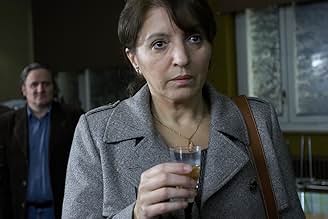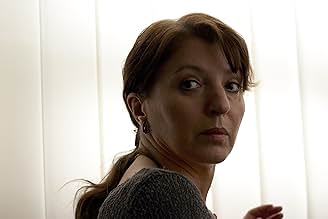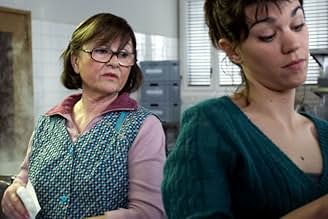Füge eine Handlung in deiner Sprache hinzuRuza left Belgrade for Switzerland as a young woman full of hope for a new, better life. 25 years later she appears to have achieved everything: She owns a canteen in Zurich, which she manag... Alles lesenRuza left Belgrade for Switzerland as a young woman full of hope for a new, better life. 25 years later she appears to have achieved everything: She owns a canteen in Zurich, which she manages with a firm grip and financial success. Ruza values her meticulously-structured daily r... Alles lesenRuza left Belgrade for Switzerland as a young woman full of hope for a new, better life. 25 years later she appears to have achieved everything: She owns a canteen in Zurich, which she manages with a firm grip and financial success. Ruza values her meticulously-structured daily routine, both in her professional and private life. Ruzas's orderly world shifts when 22-ye... Alles lesen
- Auszeichnungen
- 9 Gewinne & 2 Nominierungen insgesamt
Empfohlene Bewertungen
The details of the movie are done well, the colours, the sounds, the camera angles. With strong details but weak theme, this movie ends up feeling myopic, a feeling only underscored by the many close-up shots and the rarity of wide-angle, panoramic shots. There's a distinct lack of context - this story about immigrants, young and old, could take place anywhere. I didn't even know this was a Swiss film until I started reading other reviews.
Some movies feel intimate when they concentrate on the immediate details, as this movie does. However, the emotional remoteness of all the characters prevents any intimacy from developing, and instead all that's left is myopia.
Social topics have a long tradition in Swiss film. I just remember Kurt Früh's "Bäckerei Zürrer" where the conflicts between the early Italian immigrants and the indigenous population in Zürich are focused, or later especially in the movies of Kurt Gloor (1942-1998), f.ex. "Die Plötzliche Einsamkeit Des Konrad Steiner". Not to forget the movies of Alain Tanner, although his movies are all in French and thus form a minority in the rest of Switzerland. Also the present movie deals with immigrants, has a strong social vein, but unlike Früh's and Gloor's movie, you hardly hear Swiss German spoken. The three main actresses - famous artists imported from Ex-Yugoslawia as if there would not be enough talented Yugoslawian women familiar with the jobs shown in the movie - speak broken High German. From the rest of the cast only the two men - Andrea Zogg and the Spaniard Pablo Aguilar - are to be mentioned: Zogg is to see about four or five times for possibly 10 minutes, Aguilar for totally perhaps 2 minutes, and the rest of the crew for fragments of seconds. So, an interaction between the Yugoslawian immigrants and the Swiss population is out of the question and the movie is showing nothing else than how the three women get along, partly speaking Serbian/Croatian and partly broken German. In this movie, there is no trace of the wit, the humor, the tears-causing miseries and the whole empathy of Kurt Früh's movies, but nothing either of the socialist problems brought up in Kurt Gloor's films. This movie was produced in Switzerland, that is all. It could play anywhere in Europe, there is nothing Swiss-specific in this movie, except perhaps the five seconds when your hear Zurich's "Radio 24".
Let me tell you one thing: As long as Kurt Früh's and Kurt Gloor's movies are not subtitled, engraved in international DVDs and available around the world, such mediocre and questionable films like "Das Fräulein" have no right to go around the world.
Right the previous day I had seen Grbavica, a film by Jasmila Zbanic- a young director from Bosnia Herzegovina , starring Mirjana Karanovic, the most known actress around the Balkan countries (except maybe for Greece). Grbavica was plain, interesting but totally in control and simply a nice film with a spicy subject matter. Most enjoyable of all,Mirjana Karanovic! I was happy enough to see all her charm, if u can call it that way, in a fresh film by an upcoming director but when I saw Das Fräulein, then I finally realized the depths of her acting...
Sorry for making such an intro but this film is about her and if you get to realize what she is standing for , everything makes a lot more sense. Of course she is not the main dish and that's also an exciting thing!
Director Andrea Staka made a film to talk about what these people carry with them, what they are made of. We don't really know... We don't... It's not about characters in a film, not about a plot, it's about the actors,the director,the people of Bosnia,Yugoslavia,Serbia.. Political backgrounds, immigration, war,personal past all mixed up with youth, health and life perspective...
... all packed up in a simple, honest way... That's what it is about!
Wusstest du schon
- WissenswertesMirjana Karanovic, Marija Skaricic, and Ljubica Jovic don't speak German or Swiss-German. Although the script had all the German texts translated, they had to learn their lines by heart and act without having a true feeling for the language.
- SoundtracksGypsy Kolo (Ma Maren Ma)
Written by Ran du Bandurovici
Performed by Jony Iliev & Band featuring Martin Lubenov
(C) Asphalt Tango Records GmbH, Berlin
Top-Auswahl
- How long is Fraulein?Powered by Alexa
Details
- Erscheinungsdatum
- Herkunftsländer
- Sprachen
- Auch bekannt als
- Fraulein
- Drehorte
- Produktionsfirmen
- Weitere beteiligte Unternehmen bei IMDbPro anzeigen
Box Office
- Bruttoertrag in den USA und Kanada
- 5.715 $
- Eröffnungswochenende in den USA und in Kanada
- 2.449 $
- 21. Sept. 2008
- Weltweiter Bruttoertrag
- 5.715 $
Zu dieser Seite beitragen
























